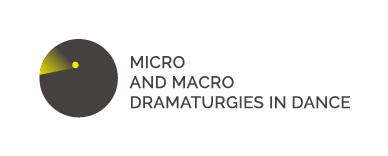In order to guarantee the quality of the content of the workshops and the tangible output, the partners decided to work with an independent, scientific team of established dramaturgs, who in dialogue with the artistic directors will further design, implement and accompany the project as facilitators.
The Belgian dramaturg, Dr. Guy Cools, will lead the team. Over the past ten years, he has developed a workshop model on dance dramaturgy and creative process for choreographers and their collaborators. He has already collaborated with Anghiari Dance Hub, DansBrabant, Dance House Lemesos and Tanec Praha. Dr. Cools will be joined by Maja Hriesik (SK), Anne-Marije Van Den Bersselaar (NL) and Katalin Trencsényi (HU/UK). The scientific team is chosen for their complementary skills in the field of dance dramaturgy. Like the partners, they also ensure geographic diversity.
Dr Guy Cools is a dance dramaturge. Recent positions include Associate Research Professor at the research institute Arts in Society of the Fontys School of Fine and Performing Arts in Tilburg, and Postdoctoral Researcher at Ghent University, where he completed a practice-based PhD on the relationship between dance and writing. He has worked as a dance critic, artistic programmer and policymaker for dance in Flanders. He now dedicates himself to production dramaturgy, contributing to work by choreographers all over Europe and Canada, such as Koen Augustijnen (BE), Sidi Larbi Cherkaoui (BE), Danièle Desnoyers (CA), Lia Haraki (CY), Christopher House (CA), Akram Khan (UK), Arno Schuitemaker (NL) and Stephanie Thiersch (DE). His most recent publications include The Ethics of Art: ecological turns in the performing arts, co-edited with Pascal Gielen (Valiz, 2014); In-between Dance Cultures: on the migratory artistic identity of Sidi Larbi Cherkaoui and Akram Khan (Valiz, 2015) and Imaginative Bodies, dialogues in performance practices (Valiz, 2016), a series of published, live interviews with major contemporary artists, which Cools curated from 2008 to 2013 for Sadler's Wells, London. With the Canadian choreographer, Lin Snelling, he developed an improvised performance practice called "Rewriting Distance" (see also: www.rewritingdistance.com) that focuses on the integration of movement, voice and writing.
Dr Maja Hriešik is a dramaturg, lecturer and researcher. She was born in Novi Sad, ex-Yugoslavia, and moved to Slovakia in the late 90s, where she completed MA studies in Aesthetics at the Philosophy Faculty and an MA in theatre directing and dramaturgy at the Academy of Performing Arts. For several years she worked as a freelance performance artist in the field of opera and theatre as well as a programmer for the largest international theatre festival in Slovakia, Divadelna Nitra. She was editor-in-chief of dance magazine Salto (2006-2011) and still regularly publishes texts on dance and hosts a programme on dance, public space and activism on Slovak public radio. For the Slovak Theatre Institute she curated international presentations of Slovak dance and workshop programmes for emerging performers. Gradually she devoted herself more to production dramaturgy, collaborating with Slovak and Czech choreographers of different generations (Marta Poláková, Jaro Viňarský, Yuri Korec, Petra Tejnorová, Lukáš Bobalík, etc.). She completed her theoretical PhD studies devoted to corporeal strategies in contemporary dance and theatre, which led to the publication of a book of essays entitled On Corporeal Dramaturgies in Contemporary Dance (2013). She is a lecturer at the Dance Faculty in Bratislava (classes on dance dramaturgy, history and aesthetics of dance) and a founding member of PlaST – Platform for Contemporary Dance, whose aim is to advocate for better conditions and visibility of Slovak contemporary dance www.plast.dance.
Dr Katalin Trencsényi is a dramaturg, researcher and theatre-maker. As a London-based freelance dramaturg, she has worked with the National Theatre, the Royal Court Theatre, Deafinitely Theatre, Corali Dance Company and Company of Angels, among others. As a theatre-maker, she has worked and taught internationally in Belgium (DANSPUNT – Out of the Toolbox Festival), Canada (Playwrights' Workshop Montréal), Poland (Festival of New Dramaturgies), Russia (Diaghilev Festival), and the US (LMDA dance dramaturgy workshop at Gibney Dance). Katalin is a co-founder of the Dramaturgs´ Network (d'n) and from 2010 to 2012 served as its president. She is the author of Dramaturgy in the Making: A User's Guide for Theatre Practitioners (Bloomsbury Methuen Drama, 2015), the editor of Bandoneon: Working with Pina Bausch (Oberon Books, 2016), and co-editor with Bernadette Cochrane of New Dramaturgy: International Perspectives on Theory and Practice (Bloomsbury Methuen Drama, 2014). Since 2018, she has edited the dramaturgy section of the award-wining global theatre portal, TheTheatreTimes.com. As a visiting lecturer, she has taught at the University of Kent, the Guildford School of Acting (University of Guildford), Kingston University, Falmouth University and the Royal Central School of Speech and Drama. Currently she is working as an associate lecturer at the Royal Academy of Dramatic Art (RADA).
Anne-Marije van den Bersselaar is a dramaturg in dance and performance art. For the past 12 years she has worked with various international choreographers, including Mor Shani, Hilde Elbers, Kristel van Issum and Joost Vrouenraets. She graduated in 2012 with an MA in Theatre Studies at the University of Utrecht, with a thesis in academic dance curricula perceived as artistic constructs. Three years ago she founded the Concept Store for Artistic Strategies: A Design Agency for Creative Storytelling (2015) to engage dramaturgical processes in various creational contexts and domains. She has been teaching art theory, philosophy and research courses at Fontys Dance Academy for over seven years. In 2014, she took part in the international Erasmus+ Project "Inclusive Dance. The Transferable Skills of the Dance Artist" as a researcher and content developer of the platform www.inclusivedance.eu (2017). This project was in collaboration with the Royal Conservatoire Antwerp and Duncan Centre Conservatory in Prague. In addition, she co-designed the new cross-disciplinary FHK Masters programme Performing Public Space (PPS). In June 2018, she took up a position at the AKV|St. Joost Master Institute of Visual Cultures to coordinate innovation and positioning of their current masters programmes in Animation, Graphic Design and Art & Media.


